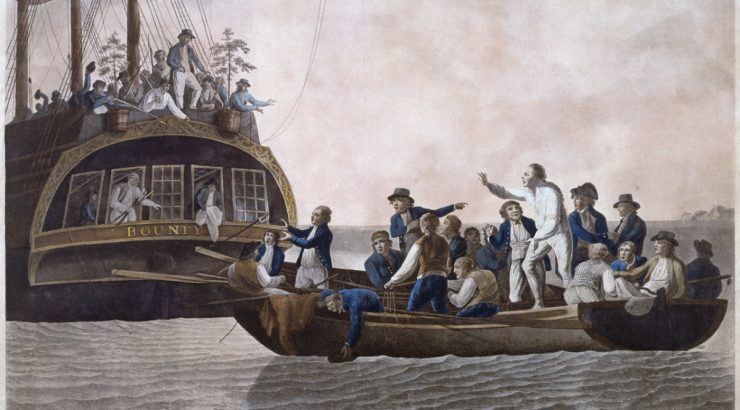
Faculty Book: Exploring Rebellion on the High Seas: Why Sailors Mutinied Against the Odds, According to Steven Pfaff’s Latest Book
October 14, 2024
 Professor Steven Pfaff, one of the Sociology Department’s newest faculty members, considers himself an eclectic scholar who gets to study all the “interesting things” – politics, religions, conflict, and social change. In his most recent book, The Genesis of Rebellion: Governance, Grievance and Mutiny in the Age of Sail (Cambridge University Press) Pfaff and co-author Michael Hechter (Arizona State University) explore why people engage in rebellions when the chances of success are modest but the dangers and risk of punishment is great. With this book, Pfaff and Hechter did something no one else had done before: systematically compare ships that had mutinies to ships that hadn’t.
Professor Steven Pfaff, one of the Sociology Department’s newest faculty members, considers himself an eclectic scholar who gets to study all the “interesting things” – politics, religions, conflict, and social change. In his most recent book, The Genesis of Rebellion: Governance, Grievance and Mutiny in the Age of Sail (Cambridge University Press) Pfaff and co-author Michael Hechter (Arizona State University) explore why people engage in rebellions when the chances of success are modest but the dangers and risk of punishment is great. With this book, Pfaff and Hechter did something no one else had done before: systematically compare ships that had mutinies to ships that hadn’t.
The Voice of Wilkinson sat down with Professor Pfaff to learn more about the award-winning book, which recently received the Allan Sharlin Memorial Book Award, from The Social Science History Association, and to find out what other projects he is working on.
Voice of Wilkinson: What did you learn while working on The Genesis of Rebellion: Governance, Grievance and Mutiny in the Age of Sail?
Steven Pfaff: We learned that grievances — the feeling that you have been unjustly treated or inadequately rewarded for your efforts — are the most important factors that led seamen in the Royal Navy during the age of sail to rebel against their officers. However, we showed using historical evidence and statistical analysis that not all grievances matter as much as others.
VoW: So then, what grievances did you find to be unimportant and why?
SP: Structural grievances, things like wage levels, unfair employment conditions, biased rules, and so on, are not very powerful motivators of high-cost collective action because they are consistent with people’s expectations about the world and their place in it. Rather, it is incidental grievances, unexpected injuries, and injustices that reveal that the people in command are incompetent or insensitive to the welfare of the people under their authority that prompt rebellion. Incidental grievances were much more important factors in explaining why mutinies occurred.
VoW: Do you think readers will understand rebellion more?
SP: I hope that they will understand the problem of rebellion better. I also want them to think about what makes for good governance and what makes for poor governance. I want them to learn about and experience something about the fascinating maritime world and the factors that, for all of the problems the Royal Navy experienced, made it the greatest sailing navy the world has ever seen.
VoW: Will you be using this book in the classroom this year?
SP: I probably won’t assign the book to any classes that I’m teaching this year, but I’d love to use it in seminars in the future. We tried very hard to write the book in an engaging and interesting way, using vivid historical episodes to draw the reader into the social scientific analysis the book is trying to perform. I think that students would like it.
We are at a very exciting time in the historical social sciences. We are able to use texts and archival records as data for making very sophisticated analyses. This is a great time to be involved in social science history in economics, political science, sociology and other fields. I hope that students will be drawn to them.
VoW: Tell me about any future projects you have in the works.
SP: Presently, I’ve been working on trying to explain the spread of the great witch hunt in early modern Europe, why the Reformation didn’t spread more widely than it did during that period and other historical projects. But I’m also working on some contemporary issues, like American attitudes about corruption, the conditions under which people take part in strikes, and why public officials discriminate against people they perceive as immigrants.

